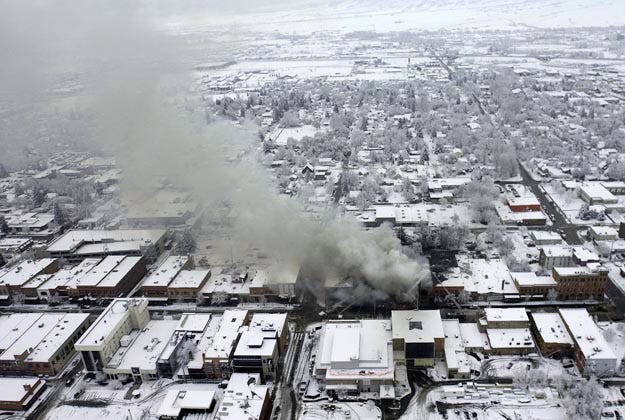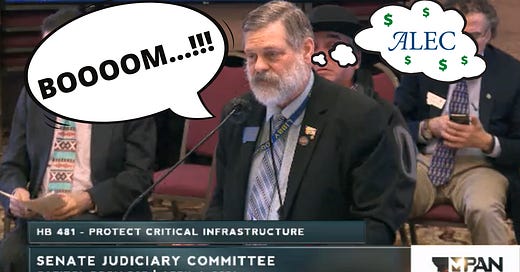A Montana Politician Falsely Accused DAPL Opponents of Using "Pipe Bombs"
Rep. Steve Gunderson justified his anti-protest bill using misinformation. Groups representing TransCanada, Enbridge, and ExxonMobil support HB 481.
UPDATE, 4/30: The 11th hour amendments to this bill struck some (but not all) of the most concerning language, specifically removing the maximum penalties for vague offenses of “impeding or inhibiting operations” of fossil fuel infrastructure. Those offenses can still result in 18 month prison sentences and $4,500 in fines. Earther has more. The enrolled bill text is here.
UPDATE 4/16/21: The Montana Senate voted to approve HB 481. The last step before going to the governor is for the House to approve amendments. :\
Paragraph 2 is edited to reflect that laws passed in Kansas and Arkansas after this post was published.
Tribal nations and organizations, civil liberties advocates, environmental groups, religious leaders and landowners are opposing the most heinous fossil fuel anti-protest bill yet: Montana HB 481.
Fossil fuel anti-protest bills have passed in 16 states, with Kansas and Arkansas being the most recent. Montana is perilously close to being next. The trend is part backlash, part revenge-insurance, after the historic resistance to the Dakota Access Pipeline (DAPL) near the Standing Rock Sioux reservation.
HB 481 includes key loopholes from an American Legislative Exchange Council (ALEC) model bill, designed to deter peaceful protest of fossil fuel projects with threats of massive fines and prison time. The bill’s sponsor, state representative Steve Gunderson, appears to be affiliated with ALEC.
In a Senate hearing last week, Rep. Gunderson predicated the bill on a flat-out falsehood:
“We saw at the DAPL pipeline what can quickly happen: protestors chaining themselves to equipment. Protestors linking arms to ban crossing a bridge. That peaceful protest quickly changed into violent rioting, burning tires, burning vehicles, the throwing of homemade explosive pipe bombs. I’ll leave you with that visual, and the lingering smell of tear gas.” [8:20:45]
In reality, the same police that shot tear gas at DAPL’s opponents admitted they also confused ceremonial pipes for explosives, as reported by the New York Times, and the LA Times:
[Morton County Sheriff Kyle] Kirchmeier acknowledged the pipe bomb allegation was incorrect, blaming it on bad intelligence.
It turned out the “weapons” were actually ceremonial pipes, according to Angela Bibens, lead attorney for the camp’s Red Owl Legal Collective. “This is a profound cultural misinterpretation of what are chanupas, or peace pipes. These are sacred ceremonial objects.”
On at least two occasions, the Morton County Sheriff’s Department has alleged that demonstrators were carrying bows and arrows, only to acknowledge later that this also was not true.
Native water protectors that formed camps to resist DAPL’s construction were attacked on camera by violent police and private security, for all to witness. [Warning - these videos can be disturbing.]
As the Senate hearing came to a close, Gunderson fantasized about arson and other hypothetical attacks on industrial sites, without offering any real examples.
If you’re feeling masochistic, you can watch that part for yourself, at 09:46:58.
Oil Lobbyists Imported these Bad Ideas
Having dismantled Gunderson’s fantasies, I’ll waste no more words on him. This legislation wasn’t even his idea.
Montana’s version of the bill is based on a law passed in North Dakota—which ALEC took credit for—except the penalties are far more vindictive.
HB 481 would establish a new maximum sentence of 30 years, and fines up to $150,000, for individuals who “impede or inhibit operations” of fossil fuel infrastructure. No violence nor damage is required to trigger these charges.
(NOTE: the final bill made changes that reduce the chance of the most harsh penalties for nonviolent offenses - see 4/30 update above)
Any organization that supports such protestors could be liable for fines up to $1,500,000.
Several fossil fuel lobbyists attended hearings to support the bill, including trade associations representing companies that lobbied for these bills in other states.
Between a House hearing in late February, and the Senate hearing on April 1st, here is who showed up to support HB 481:
The Montana Petroleum Association, which represents ConocoPhillips, Enbridge, ExxonMobil, Phillips66, and TransCanada Pipelines.
The Treasure State Resources Association, which represents the American Chemistry Council, BNSF, BP, ConocoPhillips, Enbridge, ExxonMobil, NextEra, Phillips66, and other fossil fuel trade groups.
The Billings Chamber of Commerce, which represents ExxonMobil, Phillips66, MDU Resources, and Northwestern Energy, which holds a board-level position.
The Montana Electric Cooperatives Association, the state chapter of the National Rural Electric Cooperative Association (NRECA).
The Montana Association of Oil, Gas, and Coal Counties.
Northwestern Energy, which has a repeat record of deadly pipeline explosions, and opposition to clean energy policies.

In addition to the corporate interest groups listed above, the bill was also supported by Montana Public Service Commissioner Tony O’Donnell during the Senate hearing.
Koch vs. Koch
The big surprise (for me) in last week’s Senate hearing was testimony against the bill by Henry Kriegel, of the Americans for Prosperity (AFP) Montana chapter.
Mr. Kriegel asked for bill amendments that protect free speech rights, saying the sponsors worked with AFP on changes, but had yet to incorporate any. “Once these changes are made to the current version of the bill, we will remove our opposition and remain neutral.”
Drama! Koch Industries lobbied for these laws in Iowa and Texas.
Americans for Prosperity (AFP) was founded by Koch Industries’ infamous brother co-owners in 2003. In the 18 years since, there has never been a time that AFP was not in the full control of Koch executives. (Koch Docs has more.)
Koch Industries supports trade associations that lobbied for these bills in at least eight other states.
One of those trade associations is the American Fuel & Petrochemical Manufacturers (AFPM), which took credit for setting this legislative trend in motion.
Koch has unique control within ALEC, where lobbyists and conservative state legislators meet and create template laws. ALEC was the tool that Marathon Petroleum, the AFPM, and other fossil fuel lobbying groups used to disseminate the model language for these anti-protest bills.
For CEO Charles Koch, talking out both sides of his mouth is routine strategy.
Unfortunately, there has been an increase in both centrist and progressive groups that are taking the bait offered by Mr. Koch (usually money), on issues ranging from criminal justice reform, racial justice, education, pollution and public health.
These are all problems that Mr. Koch has exacerbated, through his business, or his political spending. Entire books have been written that detail these contradictions.
AFP’s gesture in Montana does not change the fact that Koch Industries has spent over three years supporting laws that criminalize nonviolent protest.
No Union Solidarity with Tribes
This section won’t be popular with my fellow libs, but it’s the unfortunate truth.
The Montana AFL-CIO initially opposed HB 481. [See House hearing, at 08:40:55]
That didn’t last long. An amendment protecting union protests was added to the bill. Appeased by the amendment, the state AFL withdrew its opposition. All other aspects of criminalizing nonviolent trespass, and conspiracy charges for groups linked to protestors, remain in tact.
This divisive tactic was flagged by McKenna Sellers of the Northern Plains Resource Council, during testimony against the bill in last week’s Senate hearing:
“The bill makes extra effort to make clear that labor protests, and the right to strike, remain. But what about the rest of Montana citizens, in the case of non-labor activities, or expressions of the First Amendment?
If you haven’t spotted the irony here, I’ll point right at it: This is an ALEC bill.
The national AFL-CIO is a prominent critic of ALEC, and for good reason:
ALEC was used to spread “Right to Work” laws. Companies used ALEC to attack prevailing wage laws, pensions, and paid sick leave. Companies are still using ALEC to attack labor unions.
The only good thing I can say is that no unions endorsed this bill. That’s what happened in Wisconsin, and that’s what is happening in Illinois.
“Just keep race out of it, please.”
On February, 24, during a public hearing in the Montana House, it seemed to me that systemic racism was on plain display.
The House Judiciary committee chairman, Rep. Barry Usher, came across as impatient throughout the hearing. He frequently reminded constituents to be brief in their comments, and not to repeat other people’s arguments.
(Maybe the MT legislature needs to meet for more than 90 days, every two years…?)
But Rep. Usher became particularly frustrated in reaction to a fellow legislator’s comment, in perhaps the only made-for-TV moment of the hearing.
Directing a question to the Montana ACLU, which opposes the bill, Democratic Rep. Ed Stafman used a specific example to estimate the bill’s impact:
“Let’s say I invite some Native Americans who believe that there’s a burial ground on my property to protest…a pipeline. And there’s a peaceful protest. And one person of that group were to, say, spray paint a protest word on a piece of equipment, which now [under current MT law] is punishable by six months in prison, or 1,500 dollars.
“As I’m reading this bill, that person who has then defaced or ‘tampered’ equipment would be liable for 30 years in prison and 150,000 [dollars] in fines. And moreover, everyone else in the group would also be criminally and civilly liable, and if it’s an organization, they could also be subject to 1.5 million dollars in fines…?” [09:33:43]
Rep. Usher interrupted, clearly frustrated:
“Before you answer that question: Representative Stafman, hearing your example, I have no understanding why you would put ‘Native’ in there. Except to create—at least in my mind, and I saw other eyes—a racial…[trails off]. It doesn’t matter if the person in your example is White, Black, Native…it doesn’t matter. It’s a great example, I like your example, just keep race out of it, please?”
Rep. Stafman attempted to justify his example, pointing out that many Native constituents in attendance had just urged the committee to vote against the bill.
Visibly frustrated, Usher interrupted again:
“In other words, what he’s trying to say is ‘a White, a Black, or a Native burial ground’…is that better?!”
Reinforced with hand gestures and scowling.
It was the ‘…All Lives Matter…’ low moment. It’s best to watch for yourself, in full context, leading up to the 09:35:25 mark.
“Keeping race out of it” is one of the great American diversions.
Racial disparity is already baked into this story. HB 481 is just one recent example in this nation’s long history of routinely disrespecting indigenous sovereignty. Many people attending these hearings made that exact point.
With that in mind, I will publish another post in the coming days to highlight concerns that people from numerous tribal communities, organizations, and governments made in opposition to this terrible bill.





